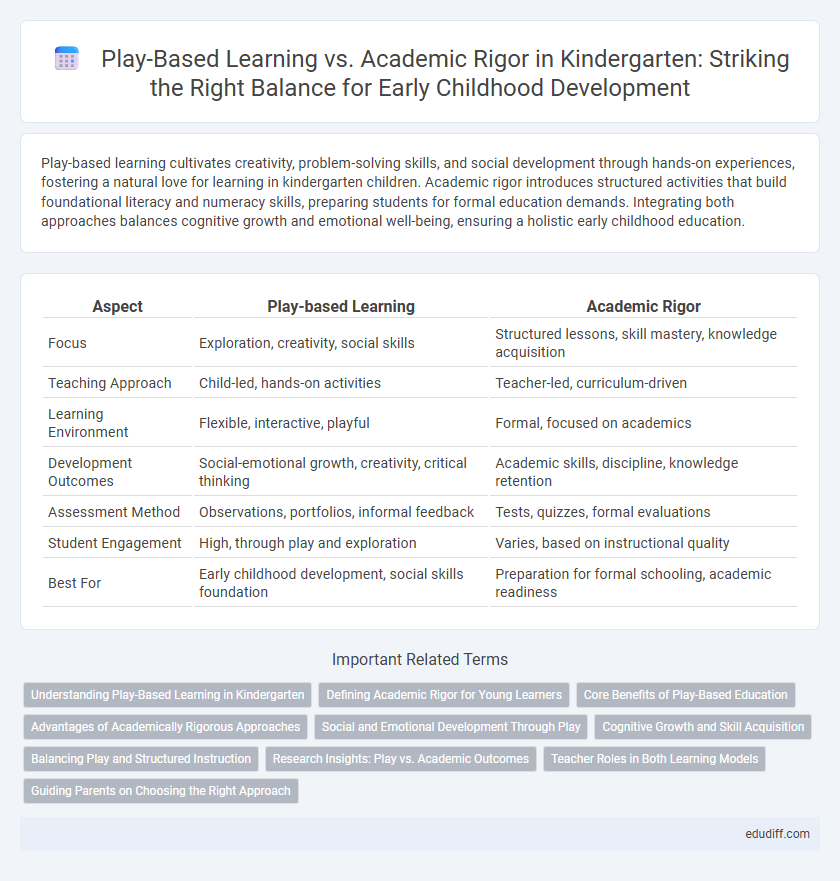Play-based learning cultivates creativity, problem-solving skills, and social development through hands-on experiences, fostering a natural love for learning in kindergarten children. Academic rigor introduces structured activities that build foundational literacy and numeracy skills, preparing students for formal education demands. Integrating both approaches balances cognitive growth and emotional well-being, ensuring a holistic early childhood education.
Table of Comparison
| Aspect | Play-based Learning | Academic Rigor |
|---|---|---|
| Focus | Exploration, creativity, social skills | Structured lessons, skill mastery, knowledge acquisition |
| Teaching Approach | Child-led, hands-on activities | Teacher-led, curriculum-driven |
| Learning Environment | Flexible, interactive, playful | Formal, focused on academics |
| Development Outcomes | Social-emotional growth, creativity, critical thinking | Academic skills, discipline, knowledge retention |
| Assessment Method | Observations, portfolios, informal feedback | Tests, quizzes, formal evaluations |
| Student Engagement | High, through play and exploration | Varies, based on instructional quality |
| Best For | Early childhood development, social skills foundation | Preparation for formal schooling, academic readiness |
Understanding Play-Based Learning in Kindergarten
Play-based learning in kindergarten emphasizes hands-on exploration, social interaction, and creativity to foster cognitive and emotional development. Research shows that children engaging in guided play develop critical thinking and problem-solving skills more effectively than through traditional academic drills. Balancing play-based methods with foundational academic concepts supports holistic growth and prepares children for future educational success.
Defining Academic Rigor for Young Learners
Academic rigor for young learners involves structured learning experiences that challenge cognitive development while promoting critical thinking and problem-solving skills. It emphasizes mastery of foundational concepts in literacy, numeracy, and social-emotional learning through age-appropriate, engaging activities. Effective academic rigor balances skill acquisition with curiosity-driven exploration to support holistic growth in kindergarten students.
Core Benefits of Play-Based Education
Play-based learning fosters creativity, social skills, and emotional development by engaging children in hands-on activities that promote exploration and problem-solving. This approach supports cognitive growth tailored to individual developmental stages, enhancing intrinsic motivation and a love for learning. Research shows that play-based education improves communication, collaboration, and self-regulation, which are foundational for long-term academic success.
Advantages of Academically Rigorous Approaches
Academically rigorous approaches in kindergarten promote early cognitive development by introducing structured literacy and numeracy skills that lay a strong foundation for future learning. These methods encourage critical thinking, problem-solving, and disciplined study habits that prepare children for higher academic demands. Research shows that children exposed to challenging academic content in early education tend to perform better in standardized assessments and demonstrate increased long-term academic achievement.
Social and Emotional Development Through Play
Play-based learning fosters social and emotional development by encouraging collaboration, communication, and empathy among kindergarten children. Academic rigor in early education must integrate playful activities to support emotional regulation and positive peer interactions. Research shows that children engaged in play-based environments demonstrate stronger social skills and resilience compared to those in strictly academic settings.
Cognitive Growth and Skill Acquisition
Play-based learning in kindergarten fosters cognitive growth by encouraging creativity, problem-solving, and social interaction, which supports foundational skill acquisition. Academic rigor, when balanced appropriately, enhances early literacy and numeracy skills essential for long-term academic success. Combining both approaches promotes a well-rounded cognitive development environment that nurtures critical thinking and adaptability in young learners.
Balancing Play and Structured Instruction
Balancing play-based learning and academic rigor in kindergarten fosters cognitive and social development by integrating hands-on activities with targeted skill-building exercises. Research shows that children retain more information and develop critical thinking skills when playful exploration is combined with structured instruction tailored to early childhood milestones. Educators optimize learning outcomes by designing curricula that blend imaginative play with foundational literacy and numeracy tasks, promoting engagement and academic readiness.
Research Insights: Play vs. Academic Outcomes
Research indicates that play-based learning in kindergarten fosters cognitive, social, and emotional development, promoting creativity and problem-solving skills. Studies show children engaged in play exhibit improved executive function and higher motivation, which correlate positively with long-term academic success. Conversely, emphasizing strict academic rigor too early can limit exploratory learning and hinder the development of foundational skills essential for future education.
Teacher Roles in Both Learning Models
Teachers in play-based learning environments act as facilitators who guide exploration and encourage creativity, fostering social and emotional development in young children. In contrast, educators in academically rigorous settings emphasize structured instruction, assessment, and mastery of foundational skills such as literacy and numeracy. Both roles require adaptability and deep understanding of child development to effectively support diverse learning needs in kindergarten classrooms.
Guiding Parents on Choosing the Right Approach
Play-based learning in kindergarten fosters creativity, social skills, and emotional development by allowing children to explore concepts through hands-on activities. Academic rigor emphasizes structured lessons and early literacy or numeracy skills, preparing children for formal schooling demands. Parents should assess their child's temperament, learning style, and long-term educational goals to select an approach that balances engagement and foundational skill-building.
Play-based Learning vs Academic Rigor Infographic

 edudiff.com
edudiff.com